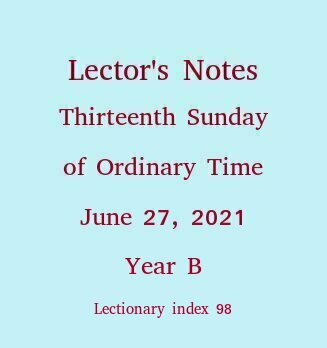

13th Sunday in Ordinary Time, year B, June 30, 2024
About a hundred years before Jesus, some Jews lived in cosmopolitan Alexandria, Egypt. They faced pressure to assimilate into the pagan culture around them. A faithful Jew wrote the book of Wisdom to help bolster their faith. Today the writer takes on the question of how a good God can permit evil and death.
In this reading, Paul is asking the Christians in Corinth to contribute to a collection for relief of a congregation in another city. The "gracious act" in which he wants them to excel is the act of charitable giving. Their giving is more than practical; it is to be imitation of our Lord.
In today's gospel, Jesus works a modest cure without really trying, and works a mighty cure while asking everyone to keep quiet about it. In Saint Mark's gospel, witnesses are to keep secret what they know of Jesus until his whole mission is revealed in his cross and resurrection.
Our Liturgical Setting: This year's journey through Saint Mark's gospel takes us today to Mark 5: 21-43, where Jesus revives a dead girl and heals a chronically sick woman. As usual, the editors of the lectionary chose a first reading to complement the day's gospel passage. This passage from Wisdom is a most interesting essay on the origins of evil and death. As presented in the lectionary, it's the ancient question, how can a good God permit this?
The Literary, Historical Setting: In the first century B.C.E., Jews were living in many places around the Mediterranean, and elsewhere, outside the original Promised Land. Many were in Alexandria, Egypt, a cosmopolitan city famous for two great libraries and a university. Many Jews there had "assimilated" into the dominant pagan culture. They and native pagans sometimes ridiculed practicing Jews. So a learned, faithful Jewish sage wrote a book of Wisdom, to bolster the faith of his friends.
Just as they do today, non-believers there were asking the faithful questions like "If your god is so good, how can he permit the deaths of innocent people? How can your god allow all the suffering in the world?" Today's lectionary selection samples the answer proposed by the Book of Wisdom. (The lectionary omits substantial passages of Wisdom, chapter 1 and chapter 2. Those verses are an interesting caricature of the nonbelievers.)
The Lector's Proclamation: To prepare to read this to the congregation, you might imagine yourself in college again. The scene is a late-night bull-session in your dorm room. You're in a discussion with a sophomore who has had enough philosophy and history courses to convince him to be an atheist. You still believe in God, pretty much, anyway, but you have all the questions that a college student is supposed to have. Your buddy demands, "If your god is all-powerful and all-good, how can he permit the AIDS epidemic [or the Holocaust, or ghetto poverty, ...]?". Your response is "God did not make death, nor does he rejoice in the destruction of the living..." In other words, read this passage to the congregation as if you were defending the goodness of God against an atheist's criticism.
The Historical Situation: The Christians in Corinth were rich in the spiritual gifts (prophecy, healing, speaking in tongues, etc., the "faith, discourse, knowledge ..." of today's first verse. See chapters 12-14 of 1 Corinthians). Here, though, Saint Paul reminds them of their material prosperity and asks them to come to the financial aid of the destitute congregation in Jerusalem. In other words, he's doing what Christian preachers have to do all the time, softening up his people to prepare for a collection.
Then Paul appeals to the example of Jesus, who, indescribably rich as Son of God, emptied himself in assuming human life and death, for our sake. This is a fine example of Paul's frequent blending of profound theology with very practical considerations of the Christian life.
Your Proclamation: The passage has four related ideas:
I am pleased to restore links to some Sunday commentaries by the late Father Roger V. Karban. When a certain diocesan newspaper updated its website, its Karban pages got renamed, and old links on Lector's Notes stopped working. In mid-2024, I found a method in the madness of the online journal, and uncovered some commentaries I had thought lost. All the Karban links below are tested, as of June 9, 2024.
Credit for the picture at the top:
Painting by Mike Holdinghaus, of Saint Louis, Missouri, U.S.A. Used with permission. See more of Mike's work here.
The artist posted a larger version of this work on social media, and later wrote this to all who praised it:
This page updated June 9, 2024